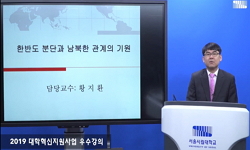이 논문은 냉전지역학으로서 북한연구가 일정한 규모와 체계를 갖추고 등장한 1960년대 북한학 성립의 안팎을 고찰하고 있다. 북한학은 북한지역을 대상으로 하는 지역연구이며, 분단과 통...
http://chineseinput.net/에서 pinyin(병음)방식으로 중국어를 변환할 수 있습니다.
변환된 중국어를 복사하여 사용하시면 됩니다.
- 中文 을 입력하시려면 zhongwen을 입력하시고 space를누르시면됩니다.
- 北京 을 입력하시려면 beijing을 입력하시고 space를 누르시면 됩니다.

냉전과 북한연구, 1960년대 북한학 성립의 안팎 = Cold War and North Korean Studies, Inside and outside the establishment of North Korean Studies in the 1960s
한글로보기https://www.riss.kr/link?id=A107799084
- 저자
- 발행기관
- 학술지명
- 권호사항
-
발행연도
2020
-
작성언어
-
-
주제어
냉전 ; 북한학 ; 냉전지역학 ; 포드재단 ; 크렘리놀리지 ; 심리전 ; 아세아문제연구소 ; 한반도평화프로세스 ; 중앙정보부 ; 한국반공연맹 ; Cold War ; North Korean studies ; Cold War geology ; Ford Foundation ; Kremlinology ; psychological warfare ; Asiatic Research institute ; Korean Peninsula Peace Process ; Korea Central Intelligence Agency ; Korea Anti-Communist League
-
등재정보
KCI등재
-
자료형태
학술저널
-
수록면
29-83(55쪽)
- 제공처
-
0
상세조회 -
0
다운로드
부가정보
국문 초록 (Abstract)
이 논문은 냉전지역학으로서 북한연구가 일정한 규모와 체계를 갖추고 등장한 1960년대 북한학 성립의 안팎을 고찰하고 있다. 북한학은 북한지역을 대상으로 하는 지역연구이며, 분단과 통일 그리고 향후 남북통합의 한반도 전체를 아우르는 실천적 통일학이자 미래학으로서의 학문적 위상과 가치를 지닌다. 1960년대 북한연구에 주목하는 이유는 북한학이 냉전에 의해 탄생했고 냉전을 동력으로 하여 한국학의 중심 영역으로 부상했으며, 이때 주조된 북한 연구의 인식론적 틀과 범주가 지금까지도 장기 지속되고 있기 때문이다. 1960년대 북한학의 출현은 냉전질서의 변동에 따른 미국의 민간재단, 박정희정권, 학술계의 목표와 이해관계가 결합되어 가능했다. 이 과정에서 북한연구의 최대 관건이던 이데올로기적 제약과 자료 문제가 획기적으로 개선됨으로써 북한연구가 본격화될 수 있었다. 포드재단의 아세아문제연구소에 대한 집중적 원조는 북한에 대한 정보 수집과 비판적 분석을 통해서 냉전체제의 대결논리를 강화하는데 있었다. 박정희정권은 반공개발동원 및 심리전 전략, 남북한 적대적 의존관계의 파열/봉합에 따른 북한 및 통일연구의 시대적 요구에 따라 북한학을 헤게모니적 지배의 유용한 전략으로 채택하였다. 민간학술계 또한 근대화와 통일문제를 결합시켜 인식하는 가운데 북한연구의 필요성을 절감하고 있었다. 이러한 구조적 맥락 속에서 북한학은 냉전지역학으로서의 학문적 정체성을 태생적으로 지닌 가운데 학문적 외연을 확장해나갈 수 있었던 것이다. 1960년대 북한연구는 크게 보아 두 방향으로 전개된다. 첫째, 북한에 관한 정보 및 자료의 생산, 배포를 독점화하여 위로부터의 북한연구를 촉성하는 동시에 이를 대내외적 심리전으로 활용하여 냉전적 남북 체제경쟁과 반공개발동원 체제를 확대 강화시키는 이념적 도구화이다. 이 과정에서 언론, 방송, 종교, 민간반공단체 등이 심리전의 하위파트너로 포섭, 배치된다. 이들 대내외 심리전의 하위파트너들이 북한을 특정 이미지화 한 크렘리놀리지를 대거 양산, 전파함으로써 냉전적 북한 이해가 전 사회적으로 부식되기에 이른다. 둘째, 일정한 학문적 체계를 구비한 북한학이 아세아문제연구소에 의해 추동되었다. 북한을 독자적 연구대상으로 설정하고 실증적, 비교방법론에 입각한 아세아문제연구소의 북한연구는 북한학의 학문적 위상 정립과 아울러 북한연구의 외연 확대와 전문성 제고를 바탕으로 북한학의 성격과 방향을 정초하는데 다대한 기여를 했다. 특히 아세아문제연구소의 북한학은 미국 냉전 지역학과의 인적, 학술적 네트워크와 긴밀하게 접속, 교류함으로써 당대 북한연구가 동아시아 및 세계적 지평을 획득하는 특징을 나타낸다. 요약하건대 1960년대 북한학은 냉전적 지식-권력체계를 본질로 하는 학문적 정체성을 지니며 등장했으며, 이 같은 이데올로기적 학문이라는 특수성은 또 다른 이데올로기성을 수반하며 오늘의 북한학으로 연결되고 있다. 1960년대 북한학은 북한을 타자화한 기존 북한학의 남북 통합적 한반도학으로의 지양을 모색하는데 유용한 참조가 될 것이다.
다국어 초록 (Multilingual Abstract)
North Korea’s research at the Asiatic Research Institute, which set North Korea as an independent research subject and based on empirical and comparative methodologies, is very helpful in establishing the nature and direction of North Korean studies based on the establishment of academic status in North Korean studies, and the expansion of North Korean studies and enhancement of expertise. Made a contribution. In particular, the North Korean Studies of the Asia Research Institute is characterized by the fact that North Korean studies at the present time acquire East Asian and global horizons by closely connecting and interacting with the US Cold War region and human and academic networks. In summary, in the 1960s, North Korean studies emerged with an academic identity based on the Cold War knowledge-power system, and this particular ideological discipline is accompanied by another ideology, leading to today’s North Korean studies. In the 1960s, North Korean studies would be a useful reference for exploring North Korea’s diversification of North Korea into an integrated Korean peninsula.
This paper examines the inside and outside of the establishment of North Korean studies in the 1960s, when North Korean studies emerged with a certain scale and system as Cold War regionalism. North Korean Studies is a regional study targeting the Nor...
This paper examines the inside and outside of the establishment of North Korean studies in the 1960s, when North Korean studies emerged with a certain scale and system as Cold War regionalism. North Korean Studies is a regional study targeting the North Korean region, and it has the academic status and value as a practical unification and future science covering the whole Korean peninsula of division, unification, and future inter-Korean integration. The reason for paying attention to North Korean research in the 1960s was that it was born out of the Cold War and emerged as a central area of Korean studies, driven by the Cold War. The emergence of North Korean studies in the 1960s was possible through the combination of the goals and interests of the United States’ private foundation, the Park Chung-hee administration, and the academic community. In this process, the ideological constraints and data problems, which were the key to the study of North Korea, have been drastically improved. Intensive assistance to the Ford Foundation’s Asiatic Research Institute was to strengthen the logic of the Cold War confrontation through collecting information and critical analysis of North Korea. The Park Chung-hee administration adopted North Korean Studies as a useful strategy for hegemony domination in response to anti-communist development mobilization and psychological warfare strategies, and the demands of North Korea and unification research due to the rupture / sealing of hostile dependences. The private academia was also reducing the need for North Korean studies while recognizing the combination of modernization and unification. In this structural context, North Korean studies were able to expand their academic ambitions with their academic identity as Cold War regionalism. In the 1960s, North Korean studies appeared in two directions. First, it is an ideological tool that monopolizes the production and distribution of information and data on North Korea to promote North Korean research from above, and uses this as internal and external psychological warfare to expand and strengthen the Cold War inter-Korean competition and anti-communist development mobilization system. In the process, media, broadcasting, religion, and civilian anti-communist organizations are included as subpartners of the psychological warfare. The sub-partners of these internal and external psychological warfare mass-produced and propagated the Kremlinology that imaged North Korea in particular, leading to the erosion of Cold War’s interests in society. Second, North Korean studies with a certain academic system was driven by the Asia Research Institute.
North Korea’s research at the Asiatic Research Institute, which set North Korea as an independent research subject and based on empirical and comparative methodologies, is very helpful in establishing the nature and direction of North Korean studies based on the establishment of academic status in North Korean studies, and the expansion of North Korean studies and enhancement of expertise. Made a contribution. In particular, the North Korean Studies of the Asia Research Institute is characterized by the fact that North Korean studies at the present time acquire East Asian and global horizons by closely connecting and interacting with the US Cold War region and human and academic networks. In summary, in the 1960s, North Korean studies emerged with an academic identity based on the Cold War knowledge-power system, and this particular ideological discipline is accompanied by another ideology, leading to today’s North Korean studies. In the 1960s, North Korean studies would be a useful reference for exploring North Korea’s diversification of North Korea into an integrated Korean peninsula.
동일학술지(권/호) 다른 논문
-
20세기 초 황해도 옹진군(甕津郡) 도서주민(島嶼住民)의 생활 양태-1905년도 옹진군(甕津郡) 남면(南面) 창린도호적(昌麟島戶籍) 자료의 분석 사례-
- 인하대학교 한국학연구소
- 임학성 ( Lhim Hak-seong )
- 2020
- KCI등재
-
- 인하대학교 한국학연구소
- 정홍영
- 2020
- KCI등재
-
전망으로서의 여성과 여성 지성의 ‘자리’ : 이효재와 조한혜정의 글쓰기를 중심으로
- 인하대학교 한국학연구소
- 김정은 ( Kim Jeong-eun )
- 2020
- KCI등재
-
‘언표’로서의 내면-1990년대 문학사의 비판적 재구성을 위한 예비적 고찰들-
- 인하대학교 한국학연구소
- 강동호 ( Kang Dong-ho )
- 2020
- KCI등재




 KCI
KCI KISS
KISS






